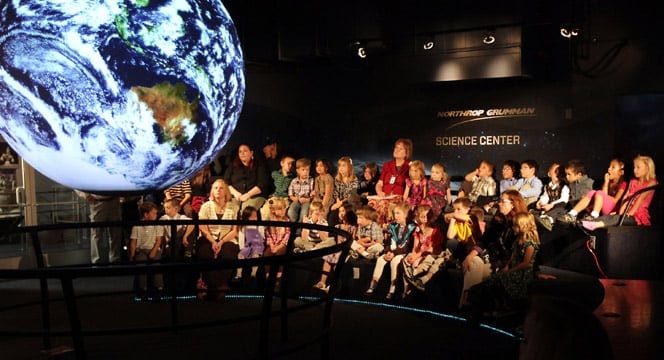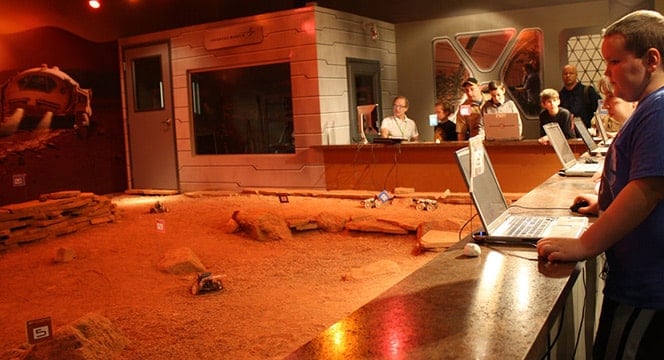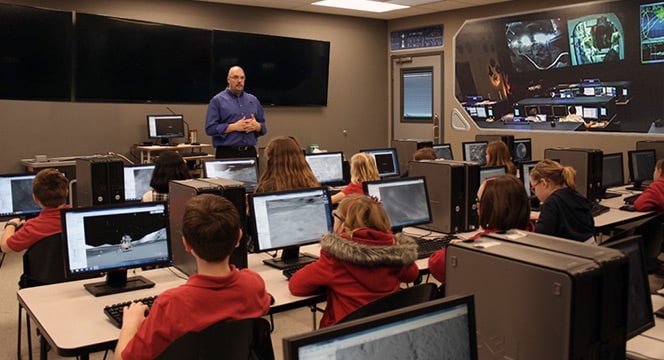Our field trips are supported by a dedicated team of volunteers, many who have worked in the space industry, giving your students real-world insight into space exploration. Students can engage with interactive exhibits and explore our recently renovated gallery. Field trip activities may include robotics, “junk” engineering, simulated space environments, and other cutting-edge technology designed to inspire curiosity and creativity.
Field trips are available year-round and can be delivered:
- In person at the Discovery Center
- Virtually through curated online experiences
Programs are open to classroom teachers, schools, educational institutions, and homeschool organizations. We also offer seasonal programs perfect for youth groups, camps, and daycares during summer months.
Do you have a question or want to book a Field Trip?
Field Trip
- $10.00 / Teacher or Adult (1 FREE teacher or adult for every 15 students)
- Min of 15 students required, max 120 students
- Topics align with Next Generation Science Standards (NGSS)
- Each field trip includes:
• Science On a Sphere® presentation
• Hands-on activity lesson aligned with the chosen topic
• Scavenger hunt in the Discovery Center Gallery - Duration: Approx 2 hours
Mini
- $10.00 / Teacher or Adult (1 FREE teacher or adult for every 15 participants)
- Min of 15 participants required, max 60 participants
- Topics align with Next Generation Science Standards (NGSS)
- Each field trip includes:
• Science On a Sphere® presentation
• Scavenger hunt in the Discovery Center Gallery - Duration: Approx 1 hour
PreK-K Mini
- $10.00 / Teacher or Adult (1 FREE teacher or adult for every 15 students or children)
- Min of 15 children required, max 60 children
- Topics align with Next Generation Science Standards (NGSS)
- Each field trip includes:
• Interactive Storytelling utilizing Science On a Sphere®
• STEM hands-on activity aligned with book - Duration: Approx 1 hour
Summer
- $10.00 / Teacher or Adult (1 FREE teacher or adult for every 15 students or children)
- Min of 15 children required, max 120 children
- Each field trip includes:
• Science On a Sphere® presentation
• Hands-on activity lesson aligned with the topic
• Scavenger hunt in the Discovery Center Gallery - June 1-August 7, 2026
- Duration: Approx 1.5 hours
Virtual
- • For up to 50 students
- • Delivered live via Zoom, using our Science On a Sphere®
- • Includes a hands-on activity lesson plan to be shared with the teacher
- • Topics align with Next Generation Science Standards (NGSS)
- • Duration: Approx 1 hour
Field Trip Topics
Mini Field Trip Topics
PreK-K Mini Field Trip Topics
Summer Field Trip Topic
Virtual Field Trip Topics
Become a Teacher Liaison
Teacher liaisons are extraordinary educators who use space-related education programs and principles in the classroom to act as advocates for space-based education in their schools and districts.

Start today to build a brighter future
To start planning your field trip, email us! sfdcreservations@spacefoundation.org




